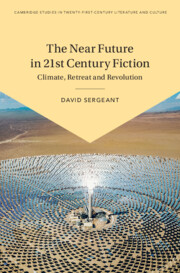Book contents
- The Near Future in Twenty-First-Century Fiction
- Cambridge Studies in Twenty-First-Century Literature and Culture
- The Near Future in Twenty-First-Century Fiction
- Copyright page
- Contents
- Acknowledgements
- Introduction
- Chapter 1 The Domestic Near Future 1
- Chapter 2 The Domestic Near Future 2
- Chapter 3 State of the Arts
- Chapter 4 Diagnostic Dead-Ends
- Chapter 5 The Art of History
- Chapter 6 Identity and Power
- Chapter 7 In Search of Revolution
- Chapter 8 The Genre of Revolution
- Notes
- Bibliography
- Index
Introduction
Fictions of the Near Future
Published online by Cambridge University Press: 07 August 2023
- The Near Future in Twenty-First-Century Fiction
- Cambridge Studies in Twenty-First-Century Literature and Culture
- The Near Future in Twenty-First-Century Fiction
- Copyright page
- Contents
- Acknowledgements
- Introduction
- Chapter 1 The Domestic Near Future 1
- Chapter 2 The Domestic Near Future 2
- Chapter 3 State of the Arts
- Chapter 4 Diagnostic Dead-Ends
- Chapter 5 The Art of History
- Chapter 6 Identity and Power
- Chapter 7 In Search of Revolution
- Chapter 8 The Genre of Revolution
- Notes
- Bibliography
- Index
Summary
The introduction traces the emergence of new forms of the near future to the global financial crisis of 2008 and ensuing events, linked to an urgent awareness of coming and needed change in relation to global environmental crisis. It argues that by merging the Anthropocene with the broader contemporary field, the near future provides a better means of understanding how global warming makes its presence felt in fiction than does a focus on ‘climate fiction’ alone. Two major themes shape contemporary culture’s relationship to the Anthropocene: the prospect of radical change, and of a broad collective. A large number of works, explored through the first half of the book as the ‘domestic near future’, recoil from the prospect of such cooperation and such change. The second half reads a set of fictions which do try to imagine new kinds of collectivity, and radical change, though they frequently struggle to find a generic form adequate to the task. In these cases, the near future acts more like the emergent form that Raymond Williams hypothesised, underlining the link between the emergent near future as narrative genre, and the cultural shift to which such a genre might correspond.
Keywords
- Type
- Chapter
- Information
- The Near Future in Twenty-First-Century FictionClimate, Retreat and Revolution, pp. 1 - 18Publisher: Cambridge University PressPrint publication year: 2022



